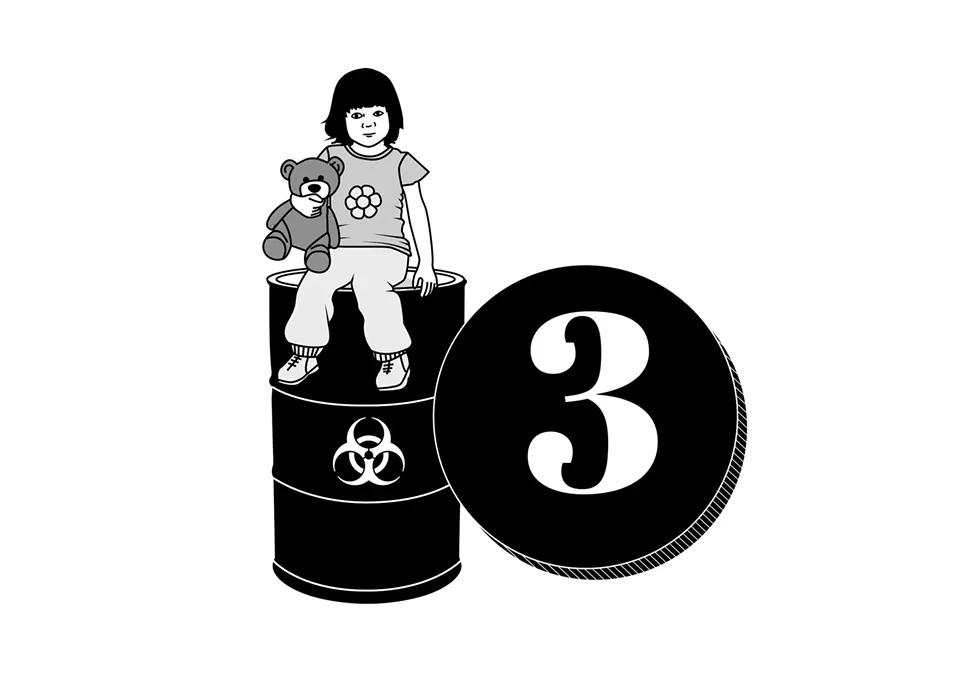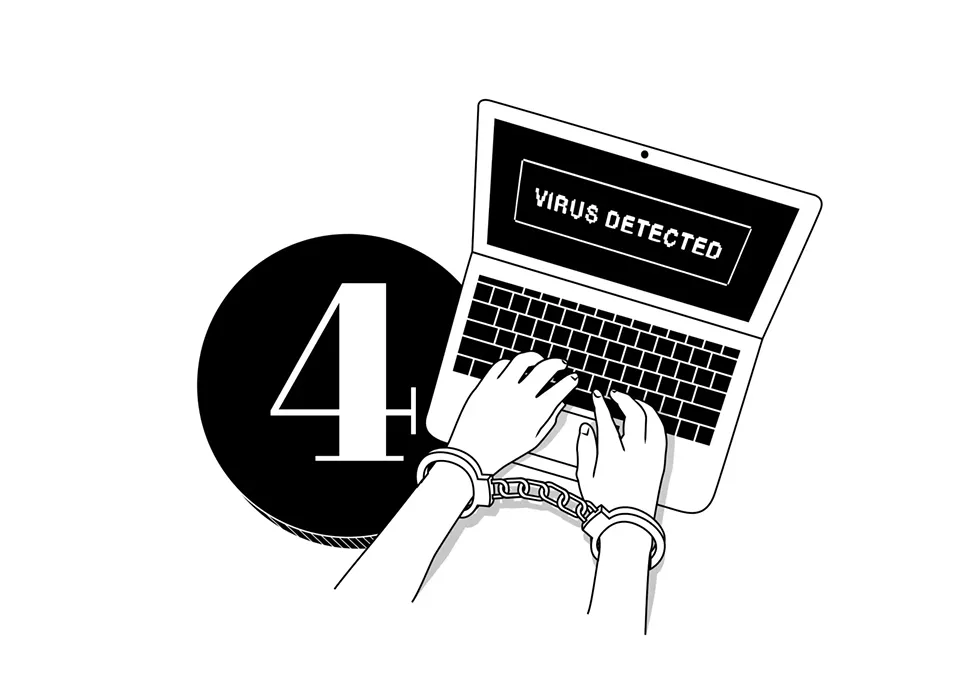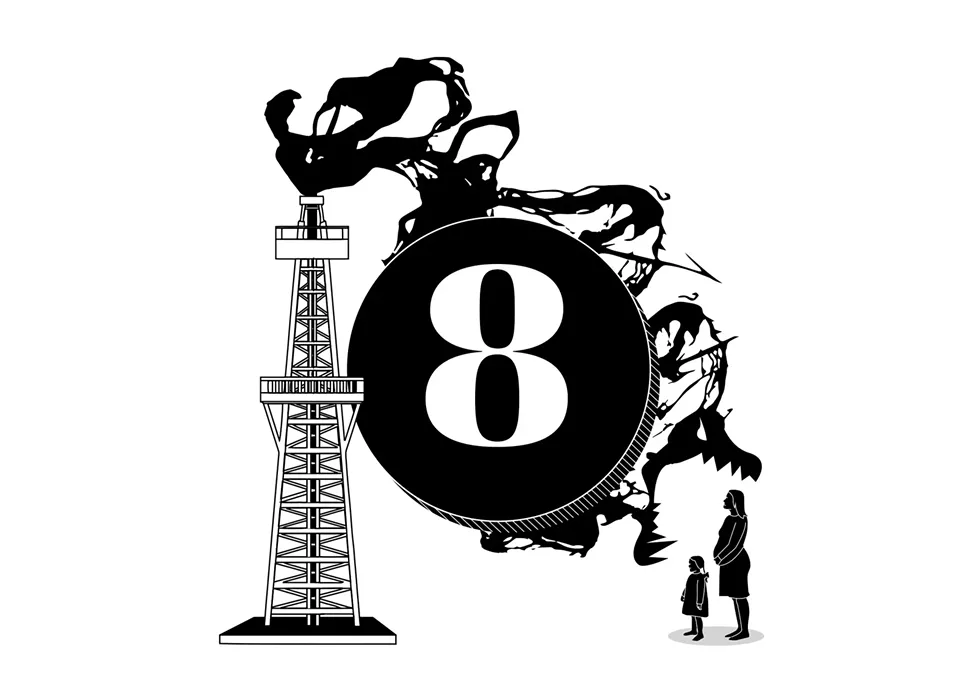"We have made the planet inhospitable to human life." That's what the lead researcher in Project Censored's No. 1 story this year said. He wasn't talking about the climate catastrophe. He was talking about so-called "forever chemicals," per- and polyfluoroalkyl substances (PFAS), linked to prostate, kidney and testicular cancer and additional health risks, and the study he led found unsafe levels in rainwater worldwide.
Even though this story received some corporate media attention — in USA Today and the Discovery Channel — the starkly shocking bottom line clearly didn't come through to the general public.
There's a second story intertwined with the "forever chemicals" pervasive presence: the revelation that companies responsible for them have known about their dangers for decades, but kept those dangers hidden — just like fossil fuel companies and climate catastrophe. The intersection of environmental/public health and corporate criminality is typical of how certain long-standing patterns of censored news weave together across the years, even decades, and how the spotlight Project Censored shines on them helps to make sense of much more than the individual stories it highlights, as vitally important as they are in themselves.
The story's dual themes — environmental harm and corporate abuse — so dominate the Top 10 story list that they send another message as well, a message about the fundamental mismatch between our needs as a species living on a finite planet and a rapacious economic system conceived in ignorance of that fact. The climate catastrophe is just the most extreme symptom of this mismatch — but it's far from the only one. Corporate abuse figures into every story in the list — though sometimes deep in the background, as with their decades-long efforts to destroy unions in story number six. Environmental harms "only" show up in seven of the 10 stories.
There are still other patterns here, to be sure — and I encourage you to look for them yourself because seeing those patterns enriches your understanding of the world as it is, and as it's being hidden from you. But this dominant pattern touches us all. The evidence is right there, in the stories themselves.
FOREVER CHEMICALS
Rainwater is "no longer safe to drink anywhere on Earth," Morgan McFall-Johnsen reported in Insider in August 2022, summing up the results of a global study of so-called "forever chemicals," polyfluoroalkyl substances (PFAS), published in the journal Environmental Science & Technology. Researchers from Stockholm University and the Institute of Biogeochemistry and Pollutant Dynamics at ETH Zurich concluded that "in many areas inhabited by humans," PFAS contamination levels in rainwater, surface water and soil "often greatly exceed" the strictest international guidelines for acceptable levels of perfluoroalkyl acids.
They're called "forever chemicals" because they take so long to break down, "allowing them to build up in people, animals, and environments," Insider reported. Prior research has linked these chemicals to prostate, kidney, and testicular cancer and additional health risks, including developmental delays in children, decreased fertility in women and men, reduced vaccine efficacy, and high cholesterol.
"PFAS were now 'so persistent' and ubiquitous that they will never disappear from the planet," Lead researcher Ian Cousins, from Stockholm University, told Agence France-Presse. "We have made the planet inhospitable to human life by irreversibly contaminating it now so that nothing is clean anymore. And to the point that it's not clean enough to be safe."
The "good news" is that PFAS levels aren't increasing in the environment. "What's changed is the guidelines," Cousins said. "They've gone down millions of times since the early 2000s, because we've learned more about the toxicity of these substances."
There's been limited corporate media coverage that rainwater isn't safe to drink — specifically from USA Today, the Discovery Channel and Medical News Today. (See the Inlander's coverage on page 11.) But the general public clearly hasn't heard the news. However, there's been more coverage of the series of lawsuits developing in response to PFAS. But the big-picture story surrounding them remains shockingly missing.
BIG TECH AND BIG BROTHER
"Google — one of the largest and most influential organizations in the modern world — is filled with ex-CIA agents," Alan MacLeod reported for MintPress News in July 2022. "An inordinate number of these recruits work in highly politically sensitive fields, wielding considerable control over how its products work and what the world sees on its screens and in its search results."
But Google isn't alone. Nor is the CIA.
Former employees of US and Israeli intelligence agencies now hold senior positions at Google, Meta, Microsoft and other tech giants. A second report focused on employees from Israel's Unit 8200, its equivalent of the CIA, which is "infamous for surveilling the indigenous Palestinian population," MacLeod wrote. Using LinkedIn, he identified hundreds of such individuals from both agencies, providing specific information about dozens of them.
"The problem with former CIA agents becoming the arbiters of what is true and what is false and what should be promoted and what should be deleted is that they cut their teeth at a notorious organization whose job it was to inject lies and false information into the public discourse to further the goals of the national security state," MacLeod wrote, citing the 1983 testimony of former CIA task force head John Stockwell, author of In Search of Enemies, in which he described the dissemination of propaganda as a "major function" of the agency.
"I had propagandists all over the world," Stockwell wrote. "We pumped dozens of stories about Cuban atrocities, Cuban rapists [to the media]. ... We didn't know of one single atrocity committed by the Cubans. It was pure, raw, false propaganda to create an illusion of communists eating babies for breakfast."
"None of this means that all or even any of the individuals are moles – or even anything but model employees today," MacLeod noted later. But the sheer number of them "certainly causes concern."
UNREGULATED TOXIC CHEMICALS
The United States is "a global laggard in chemical regulation," ProPublica reported in December 2022, a result of chemical industry influence and acquiescence by the Environmental Protection Agency over a period of decades, according to reporters Neil Bedi, Sharon Lerner and Kathleen McGrory. A headline example: Asbestos, one of the most widely recognized toxic substances, is still legal in the U.S., more than 30 years after the EPA tried to have it banned.
Through interviews with environmental experts and analysis of a half century's worth of legislation, lawsuits, EPA documents, oral histories, chemical databases, and regulatory records, ProPublica uncovered the longstanding institutional failure to protect Americans from toxic chemicals.
ProPublica identified five main reasons for failure, but chief among them is the fact that the chemical industry helped write the 1976 Toxic Substances Control Act. A top EPA official "joked the law was 'written by industry' and should have been named after the DuPont executive who went over the text line by line," ProPublica reported. The law "allowed more than 60,000 chemicals to stay on the market without a review of their health risks" and required the EPA to always choose the "least burdensome" regulations. "These two words would doom American chemical regulation for decades."
ProPublica also showed that the EPA employs industry-friendly scientists as regulators. "The EPA has a long history of hiring scientists and top officials from the companies they are supposed to regulate, allowing industry to sway the agency's science from the inside," ProPublica wrote. A prime example is Todd Stedeford. "A lawyer and toxicologist, Stedeford has been hired by the EPA on three separate occasions," ProPublica noted. "During his two most recent periods of employment at the agency — from 2011 to 2017 and from 2019 to 2021 — he was hired by corporate employers who use or manufacture chemicals the EPA regulates."
STALKERWARE AND ABORTION BANS
Stalkerware — consisting of up to 200 surveillance apps and services that provide secret access to people's phones for a monthly fee — could become a significant legal threat to people seeking abortions, according to a pair of articles published in the wake of the U.S. Supreme Court's decision to overturn the constitutional right to abortion.
"Abortion medication is safe. But now that Roe is overturned, your data isn't," Rae Hodge wrote for the tech news site CNET just two days after the Dobbs decision overturned the nearly 50 year precedent. "Already, the digital trails of abortion seekers can become criminal evidence against them in some states where abortion[s] were previously prosecuted. And the legal dangers may extend to abortion seekers in even more states."
The next month, writing for Slate, University of Virginia law professor Danielle Keats Citron warned that "surveillance accomplished by individual privacy invaders will be a gold mine for prosecutors targeting both medical workers and pregnant people seeking abortions."
Invaders only need a few minutes to access phones and passwords. "Once installed, cyberstalking apps silently record and upload phones' activities to their servers," Citron explained. "They enable privacy invaders to see our photos, videos, texts, calls, voice mails, searches, social media activities, locations — nothing is out of reach. From anywhere, individuals can activate a phone's mic to listen to conversations within 15 feet of the phone," even "conversations that pregnant people have with their health care providers — nurses, doctors, and insurance company employees."
The Biden administration has proposed a new rule protecting "certain health data from being used to prosecute both clinicians and patients," STAT reported in May 2023, but the current draft only applies "in states where abortion is legal."
RAINFOREST CARBON OFFSETS 'WORTHLESS'
"The forest carbon offsets approved by the world's leading certifier and used by Disney, Shell, Gucci, and other big corporations are largely worthless and could make global heating worse, according to a new investigation," the Guardian reported on Jan. 23, as part of joint nine-month reporting project with SourceMaterial and Die Zeit. "The analysis raises questions over the credits bought by a number of internationally renowned companies — some of them have labeled their products 'carbon neutral' or have told their consumers they can fly, buy new clothes or eat certain foods without making the climate crisis worse."
About 90% of rainforest carbon offsets certified by Verra, the world's largest offset certifier, do not reflect real reductions in emissions. Verra has issued more than 1 billion metric tons worth of carbon offsets and certifies three-fourths of all voluntary carbon offsets.
While Verra claimed to have certified 94.9 million credits, the actual benefits amounted to a much more modest 5.5 million credits. This was based on an analysis of the only three scientific studies to use robust, scientifically sound methods to assess the impact of carbon offsets on deforestation. The journalists also consulted with indigenous communities, industry insiders and scientists.
"The studies used different methods and time periods, looked at different ranges of projects, and the researchers said no modeling approach is ever perfect," the Guardian wrote. "However, the data showed broad agreement on the lack of effectiveness of the projects compared with the Verra-approved predictions."
Another study conducted by a team of scientists at the University of Cambridge found that in 32 of the 40 forest offset projects investigated, the claims concerning forest protection and emission reductions were overstated by an average of 400%.
While Verra criticized the studies' methods and conclusions, an outside expert, Oxford ecoscience professor Yadvinder Singh Malhi, had two doctoral students check for errors, and they found none.
"I wish it were otherwise, but this report is pretty compelling," he told the Guardian.
The investigations by the Guardian, Die Zeit and SourceMaterial appear to have made a difference. In March 2023, Verra announced that it would phase out its flawed rainforest offset program by mid-2025. But they could only find one brief mention of the joint investigation in major U.S. newspapers, a Chicago Tribune op-ed.
UNIONS WON BIG
Unions won more than 70% of their certification elections in 2022, according to reporting by NPR and the Conversation, and workers of color were responsible for 100% of union growth, according to an analysis by the Economic Policy Institute reported by Payday Report and the New Republic.
Seventy-one percent of Americans now support unions, according to Gallup — a level of support not seen since 1965. "Dismantling existing barriers to union organizing and collective bargaining is crucial to generating a more prosperous, equitable economy," EPI concluded.
More than a quarter of 2022 union elections, 354, were held at Starbucks, Marick Masters explained in his January 2023 article for the Conversation. Workers at Starbucks prevailed in four out of every five elections. Workers at Chipotle, Trader Joe's and Apple unionized for the first time, while workers at Microsoft and Wells Fargo also had wins.
Union activity spikes during times of social unrest, Masters reported. Unionization rose from 7.6% to 19.2% from 1934 to 1939, during the Great Depression, and from 20% to 27% between 1941 and 1945, during World War II. Masters described the current wave of union activity as driven by record levels of economic inequality and continued mobilization of workers in "essential industries," such as health care, food, and public safety, who were thrust into harm's way during the global pandemic.
Despite these gains, the power of organized labor is nowhere close to what it once was. As Masters pointed out, more than a third of workers were unionized in the 1950s, whereas only a 10th were in 2021. Before the 1980s, there were typically more than 5,000 union elections in any given year, and as recently as 1980, there were 200 major work stoppages compared to just 20 in 2022, which was still 25% above the average over the past 16 years.
Corporate media coverage of the labor resurgence of 2022 was highly selective and, in some ways, misleading. There've been hundreds of articles on union organizing at Starbucks and Amazon and among graduate students, yet corporate coverage of current labor organizing often fails to address the outsized role played by workers of color in union growth. Nor has it placed recent union successes in the historical context of prolonged decline, largely due to private employers' heavy-handed efforts to undermine organizing campaigns and labor laws that strongly favor employers.
FOSSIL FUEL INVESTORS BLOCK CLIMATE REGULATIONS
"Litigation terrorism." That's what Nobel Prize-winning economist Joseph Stiglitz called the practice of fossil fuel companies and investors suing governments in secretive private tribunals to thwart climate change policies.
Litigants claim climate change laws undermine their profits, and thus they must be compensated under what's known as "investor-state dispute settlement," or ISDS, legal actions, Rishika Pardikar reported for the Lever in June 2022, following a paper in Science by lead author Kyla Tienhaara the month before. It found that "global action on climate change could generate upward of $340 billion in legal claims from oil and gas investors," which "is more than the total level of public climate finance globally in 2020 ($321 billion)."
A good portion threatens the global south.
"The five countries with the greatest potential losses from ISDS are Mozambique ($7-31 billion), Guyana ($5-21 billion), Venezuela ($3-21 billion), Russia ($2-16 billion), and the United Kingdom ($3-14 billion)," Tienhaara reported. "If countries decide to also cancel oil and gas projects that are currently under development, this could introduce substantial additional financial losses from ISDS claims."
In December 2021, Lea Di Salvatore wrote a report for the International Institute for Sustainable Development stating that fossil fuel "investors succeeded in 72% of all cases," winning an average over $600 million, "almost five times the amount awarded in non-fossil fuel cases." In addition, secrecy is the rule: "54% of the concluded fossil fuel cases are confidential — while their existence is known, no case-related documents, such as awards or decisions, have been made public."
While the Independent also reported on ISDS lawsuits, it only briefly touched on the concern that these lawsuits could prevent climate action. Beyond this handful of reports, the topic has received little coverage from major news outlets.
OIL AND GAS EXTRACTION LINKED TO CHILDHOOD LEUKEMIA
Two epidemiological studies, from 2021 and 2022, provide new evidence that living near oil and gas extraction sites is hazardous to human health, especially for pregnant mothers and children, as reported by Nick Cunningham for DeSmog and Tom Perkins for the Guardian.
Based on 1996-2009 data for more than 2.8 million pregnant women in Texas, researchers from Oregon State University found that "for those pregnant women within one kilometer of drilling there's about a 5% increase in odds of gestational hypertension, and 26% increase odds of eclampsia," researcher Mary Willis told DeSmog. (Eclampsia is a rare but serious condition where high blood pressure results in seizures during pregnancy.) "So, it's this really close range where we are seeing a potential impact right on women's health."
A second study on fracking, from Yale, found that "young children living (within 1.2 miles of) fracking wells at birth are up to three times more likely to later develop leukemia," according to an August 2022 Guardian story. "Hundreds of chemicals linked to cancer and other health issues may be used in the [fracking] process, including heavy metals, polycyclic aromatic hydrocarbons, volatile organic compounds, benzene and radioactive material."
State and local governments have tried to create health buffer zones, but "the oil industry has consistently fought hard to block setback distance requirements," DeSmog reported.
For example, "in 2018, the oil industry spent upwards of $40 million to defeat a Colorado ballot measure that would have imposed 2,500-foot setback requirements for drillers." Regulations are so weak that "in Texas, drilling sites can be as close as 45 meters from residences," Willis told them.
"Last year, California Gov. Gavin Newsom announced new proposed rules that would require 3,200-foot setbacks on new oil and gas drilling, which would be the strongest in the nation and aligns with the distance where Willis's studies find the most serious risks for pregnancies," DeSmog reported. "But those rules would not affect existing wells."
No major U.S. newspapers appears to have covered either the OSU or the Yale study, although Smithsonian magazine, the Hill and WHYY, an NPR affiliate serving the Philadelphia region, covered the fracking study.
DEADLY DECADE FOR ENVIRONMENTAL ACTIVISTS
At least 1,733 environmental activists were murdered between 2012 and 2021 — nearly one every two days across 10 years — according to the Global Witness study, Decade of Defiance. They were "killed by hitmen, organized crime groups and their own governments," Patrick Greenfield reported for the Guardian, "with Brazil, Colombia, the Philippines, Mexico and Honduras the deadliest countries."
"This has been going on for decades," scientist, activist, and author Vandana Shiva wrote in a foreword to the report.
"The report shows Brazil has been the deadliest country for environmental defenders with 342 lethal attacks reported since 2012 with over 85% of killings within the Brazilian Amazon," Stuti Mishra reported for the Independent. "Mexico and Honduras witnessed over 100 killings while Guatemala and India saw 80 and 79 respectively, remaining one of the most dangerous countries. The report also reports 12 mass killings, including three in India and four in Mexico."
The killing of environmental activists has been concentrated in the Global South, and Indigenous land defenders are disproportionately impacted. The Guardian reported that 39% of those killed were from Indigenous communities, despite that group constituting only 5% of the global population.
But "campaigners are hopeful that progress is being made," the BBC reported, citing the sentencing of a former energy executive to 22 years in prison in Honduras for the murder of world-renowned activist Berta Cáceres in 2016, as well as promising international agreements. The Escazú agreement, the first environmental and human rights treaty for Latin America and the Caribbean "commits countries to prevent and investigate attacks on environmental defenders," and went into force in 2021. Mexico has ratified it, but "others including Brazil and Colombia have not" so far, the BBC said. There are also plans by the European Union to pass laws making companies responsible for human rights abuses in their supply chains.
"These are game-changing decisions that could make a real positive impact for environmental defenders," Shruti Suresh of Global Witness told the BBC. "We should be optimistic. But it is going to be a difficult and challenging road ahead."
CORPORATE PROFITS AND BONUSES HIT RECORD HIGH
"Corporate profits in the U.S. surged to an all-time record of $2 trillion in the second quarter of 2022 as companies continued jacking up prices, pushing inflation to a 40-year high to the detriment of workers and consumers," Jake Johnson reported for Common Dreams in August 2022.
This followed Johnson's reporting in March that the average bonus for Wall Street employees rose an astounding 1,743% between 1985 and 2021, according to an analysis by Inequality.org of New York State Comptroller data. Then, in December 2022, he reported that "earnings inequality in the United States has risen dramatically over the past four decades and continues to accelerate, with the top 0.1% seeing wage growth of 465% between 1979 and 2021 while the bottom 90% experienced just 29% growth during that same period," according to research by the Economic Policy Institute (EPI). As a result, the average incomes of the top 0.1% rose from 20 times that of the bottom 90% in 1979 to more than 90 times as much in 2021.
The fossil fuel industry has enjoyed especially lavish profits. Jessica Corbett reported in July 2022 for Common Dreams that the eight largest oil companies' profits spiked a whopping 235% from the second quarter of 2021 to the second quarter of 2022, for a combined $52 billion profit, according to an analysis by Accountable.US.
"Make no mistake; these profits mark a large transfer of wealth from working- and middle-class people to wealthy oil executives and shareholders," Jordan Schreiber of Accountable.US told Corbett. "While many consumers were feeling the heavy burden of a life necessity suddenly doubling in price, oil executives were keeping prices high to maximize their profits."
ExxonMobil profited $17.85 billion; Chevron, $11.62 billion; and Shell, $11.47 billion. Notably, in 2021-2022, the oil and gas industry spent more than $200 million lobbying Congress to oppose climate action. ♦
Project Censored, a nonprofit news organization dedicated to media literacy and fighting censorship. Find out more at projectcensored.org.





















